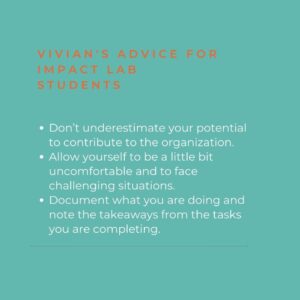At Foundation for Shared Impact (FSI), we are passionate about nurturing the next generation of social impact leaders. Since 2014, we have empowered over 900 students from more than 40 countries via the Impact Lab Course, during which they have contributed over 119,280 hours of work in HK social businesses and NGOs. These students have taken the shared impact philosophy and applied it to their careers and community service, with former students starting their own social impact organizations, joining NGO boards, and leading fundraising and COVID-related initiatives.
One of these students is Vivian (Solyoung) Seo, who was born and raised in Korea, and came to Hong Kong for university studies in the summer of 2013. As the 2014 cohort of the Impact Lab Course (previously known as the Social Venture Management Course), Vivian worked as a marketing intern at Fair Employment Agency (“FEA”), the first employment agency in Hong Kong to advocate ethical hiring of domestic helpers. Read this interview on her learnings and takeaways from her internship, how it has shaped her career path, her thoughts on youth empowerment, and her advice for impact-driven youth.

What were your roles and responsibilities at Fair Employment Agency?
I was hired to be an intern in the Marketing Team to look after FEA’s social media channels. Initially, I was assigned to respond to customer inquiries and to create the internal guideline for customer support provided through our social media. I ventured a little bit to create and design new social media posts in the card news format, which received positive feedback from FEA and thereafter led me to design most of FEA’s publicity materials (e.g. Press Kit, Brochures, Factsheets etc.).
How has your Impact Lab experience influenced your career or study plan?
The Impact Lab Course was an eye-opening experience for me. It showed me that participating students actually have something to contribute to real business. However small the first assigned task appeared to be, I realized that as long as I proactively initiated conversations to ask to be involved in more projects and responsibilities, I could learn and take ownership in so much more. This influenced my overall mindset in participating in any other internships, and has enabled me to take ownership over my tasks and to be willing to get out of my comfort zone.
Impact Lab was also my very first internship experience, so it gave me a great opportunity to learn how the professional world runs. I learned how to embrace both positive and negative feedback from colleagues, how to manage time and prioritize tasks, and how to communicate professionally.
Having the Impact Lab experience fortified my long-term goal and interest in the social impact space. Working to contribute to society and to leave a positive mark in the world I live in is a fulfilling experience. But right after graduation, I did not feel ready or equipped with any skills to bring into the space, which is why I decided to first start my career at Goldman Sachs (as I majored in finance), to learn the professional soft skills so that I can apply them in the social entrepreneurship world now.
Tell us about your recent change in career direction?
I worked in the Global Compliance division in Goldman Sachs for three years after graduating from HKU. After leaving Impact Lab, I was able to retain my connection with David Bishop, the instructor of Impact Lab and co-founder of FSI, and eventually, that led me to joining FSI as a project manager. I am also project manager at Weavatools Limited, a Hong Kong-based EdTech startup that promotes global digital literacy, and I am in charge of Business Development at Gowld Art Centre, a Hong Kong-based arts & culture social enterprise.

Why is youth empowerment important?
In my view, youth empowerment builds youth autonomy and diversity. Helping youths realize that they can contribute to businesses that are making an actual impact in the world can motivate youth engagement and unleash their potential. When given the opportunity to be empowered by such responsibilities, youths will learn to be more proactive in seeking their personal goals in career and to achieve what they each believe in.
Your advice to this year’s Impact Lab students?
- Don’t underestimate your potential to contribute to the organization. Try thinking about whose time you can save, whose task you can help cover, which project you can lead and expand your scope in.
- Allow yourself to be a little bit uncomfortable and to face challenging situations. When in need, actively seek feedback and ask questions – sometimes these can serve as a useful agenda for you to connect with people around you.
- Document what you are doing and note the takeaways from the tasks you are completing – this helps you to consciously think about what experiences or skills you are accumulating.
What would you say to impact-driven youth who would like to start their own project or organization to make the world a better place?
First of all, if you already know what you want to build, go for it! But do it with support and help from your mentors and educators around you. Seek resources and expertise that you may not have handy – your network can connect you to the people or organizations that do.
Personally, when I was a student, I had always been impact-driven. However, I did not have a particular project or organization I wanted to devote my time and career to. For those of you who may be able to relate, I recommend you to look for different forms of engagements in the social impact space along your career journey. You can start with being involved in a side hustle or volunteering sessions while you have a full-time job – stay open to different opportunities with which you can actualize your impact!



